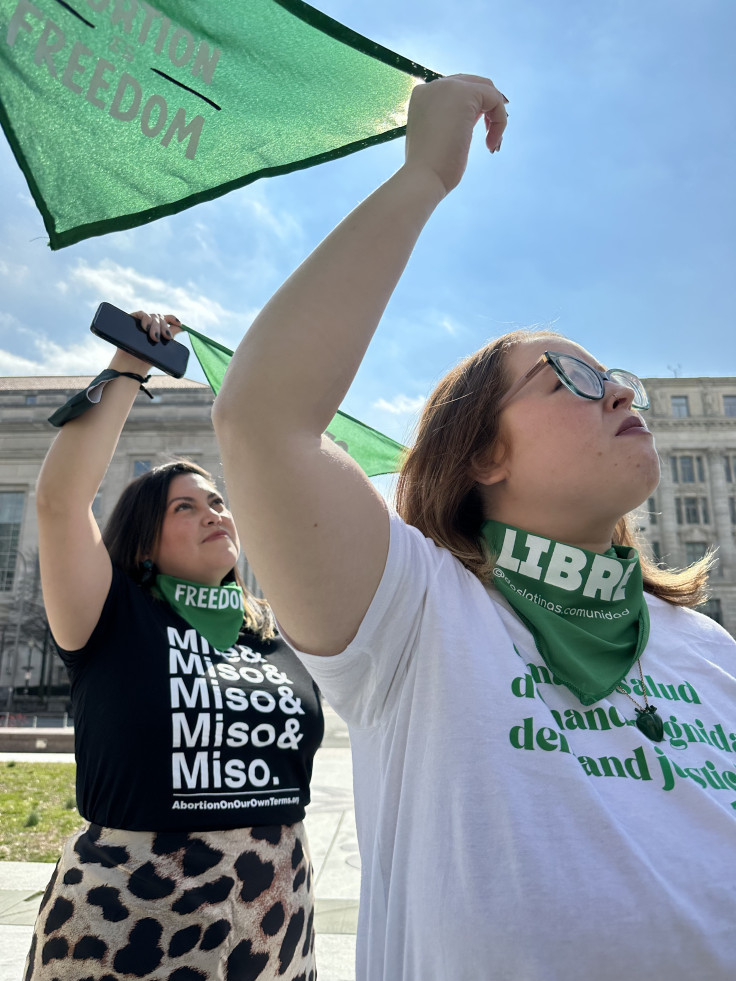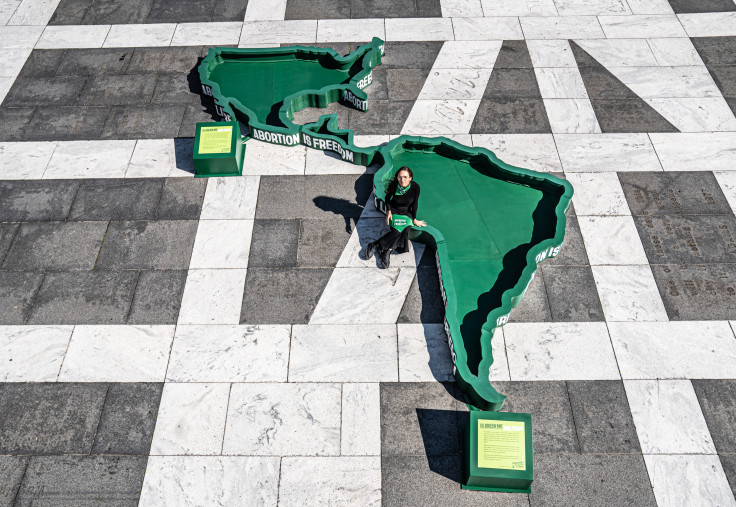This article is part of The Latin Times' Latinas 2024, a thematic week focused on Latina's impact on the U.S. economy, culture, and politics. Although Latinas comprise more than 30 million people in the U.S., according to the Pew Research Center, they still face major day-to-day challenges, including underrepresentation, the gender pay gap, labor discrimination, and sexual harassment. Discover our articles and interviews exploring the complexities of being Latina in the U.S. today.

Yamila Ruiz is the Senior Director of Communications and Public Affairs at the National Latina Institute for Reproductive Justice, which defines itself as the only organization advocating for women's health rights that is focused on Latinas and their communities.
Some of the pictures she shares with The Latin Times show her smiling with a green bandana, a symbol of support for abortion rights also known as "el pañuelo de la marea verde" (the green tide's bandana) which was created in Argentina, her parents' homeland.
Yamila is certain that the "powerful" experiences of activism in Latin American countries have shown that a "cultural shift" is possible when it comes to destigmatizing decisions regarding the right to choose over one's body.
"I would be lying if I said the last few years have been easy," the activist said, in reference to the overturning of Roe V. Wade. These and other subjects were addressed in this interview, which is part of the "Latina Week" special at the Latin Times, coinciding with International Women's Day.
The following conversation was edited for clarity and length.
How are Latinas currently experiencing the overturning of Roe v. Wade?
Since the Supreme Court overturned Roe v. Wade, the impact has really disproportionately harmed Latinas, immigrants, and all communities of color. Latinas are the largest group of women of color impacted by current or likely state bans. Over 6.7 million Latinas, including 43% of all Latinas of reproductive age from 15 to 49, live in the 26 states that have either banned or are soon to ban abortion access. So you have almost half the population of Latinas living in very restrictive states, and politicians and judges are trying to ban abortion care and other reproductive health care even more. Their true goal is to ban abortion nationwide.

Does it really? Where do you see it?
One topic that we are closely monitoring is the Supreme Court, which is scheduled to begin oral arguments on March 26th regarding a case involving mifepristone, an effective medication used in a two-step regimen for abortion care. It has been used for more than 20 years in the United States, and it has been widely vetted by the World Health Organization. It is a very safe and effective way to terminate your pregnancy, and one of the most frequently used and most accessible methods, meaning that people can do this at home.
We also know that efforts to restrict access to abortion medication have nothing to do with actual safety, even though that's what they're claiming, but that anti-abortion judges and politicians put the health and well-being of people who need abortion care as part of their agenda. This is just one tool that they're deploying.
And medical abortion is also the most accessible method for Latinas living in restrictive states who are unable to travel, as they can receive the pills by mail, correct?
Folks have access to mifepristone by mail. That's true. That's not something that the Latina Institute is involved with directly, but we often work with partners who are advocating for the accessibility of medication abortion by mail. We believe that we should have even more access. This should be something that pharmacies can dispense with one call to your doctor to be able to safely and effectively terminate your pregnancy at home. Even before Roe, there were many places in rural America that are very disconnected from metropolitan centers and health care facilities. And it could take weeks to get an appointment.
Similarly, we've been advocating to expand access to birth control and over-the-counter birth control pills. We just had a recent victory where the FDA ruled that Opill is going to be largely available in pharmacies this year. We've been advocating for a $15 price point for a three month supply. I wanted to mention that too, because as we're in an abortion crisis, we so often find ourselves talking about abortion, but we really advocate for the full spectrum of reproductive health care for Latinas.
What other issues are you advocating for?
This also includes cervical cancer screenings and other preventive health care practices. Due to many OBGYNs, and doctors leaving states where they can no longer perform abortions, there are higher rates of women and folks not getting screened for conditions like cervical cancer and sexually transmitted diseases. This is the ripple effect from the Supreme Court's decision to today, nearly two years later. And that's just the kind of cases that we know about. There's a lot more things that are going underreported as well. And then we know that there's things that are less quantifiable, like misinformation. Latinas specifically have experienced high rates of misinformation contributing to this climate of fear and uncertainty for our communities

In what ways you observe misinformation spreading, and do language barriers heighten Latinas' susceptibility to it?
It's really a combination of things, such as language barriers, and people's fear due to their status in this country. People without documentation in states like Texas, where there's a heavy presence of US Customs and Border Patrol, cannot travel from a major route to another state for abortion care because they risk family separation, detention, and even deportation.
This feeds into this climate of fear and uncertainty, which impacts the decisions of so many immigrants who need access to abortion care. We hope people would turn to us, but we know that we can't be everywhere and they're turning to unsafe sources of information, such as the Anti-Abortion Clinics or Crisis Pregnancy Clinics, which prey on this culture of fear, misinformation and disinformation, and they advertise to many of our communities.
How do those 'clinics' operate?
What is really harmful to see, and really terrifies me is that they know exactly that people are in this crisis moment in their life, and they'll do things like in New York, where they take out ads where they use black and brown or Latina black women as the models advertising for free pregnancy tests and screenings in Spanish. And then when you are expecting to see a nurse or a doctor, oftentimes they just have these caseworkers who are dressed in white coats to give the presumption that they are medical experts when they're not, and they will convince people to not have an abortion essentially.
They also use a lot of online tools so when you type in a Google search "I'm pregnant, what do I do" they pop up in the search engines as one of the top. They use over 35 to almost 40 percent of their budget on advertising.

How is this working in social media?
Anti-abortion groups use social media as a tactic. They spread misinformation on messaging apps like Facebook Messenger and WhatsApp, which Latinos in this country have a heavy reliance on, because that's how they communicate with their friends and family and loved ones back home. They create false memes, false reporting, making false claims essentially. And that gets widely circulated on these social messaging platforms. We have seen that in English language there's a certain number of fact checkers that Facebook put to work during election years to essentially make sure that the public is getting correct information, but there's a lot fewer of those fact checkers in Spanish language. This could be very harmful as well, especially in the context of such a pivotal election as we're facing this year, and considering the Latino voters are a huge portion of the voting population.
Is the abortion issue one of the main topics discussed today by the presidential candidates in 2024 Elections?
Latinos support access to abortion care and don't want politicians that ban abortion and interfere with their personal health care. Latinos are not a monolith. They may come from a very restrictive country like the Dominican Republic or El Salvador, or maybe they come from Colombia, Argentina, Mexico or Brazil, countries that have recently made advances.
Sometimes we see there's a common misconception that Catholic Latinos are against abortion. But really we have seen polling that says actually, 70 to 73% of Catholic Latinos support abortion, and nine out of ten Latinos would support a loved one seeking abortion care, regardless of their own views. So, candidates can't ignore that abortion is a winning issue and something that voters care about, and that Latinos overall are a growing bloc. You know, 20 years ago, it might have just been like "oh, well, they're such a small minority," but now we're such a powerful electorate in this country, just like black voters, just like AAPI (Asian) voters.
© 2024 Latin Times. All rights reserved. Do not reproduce without permission.







